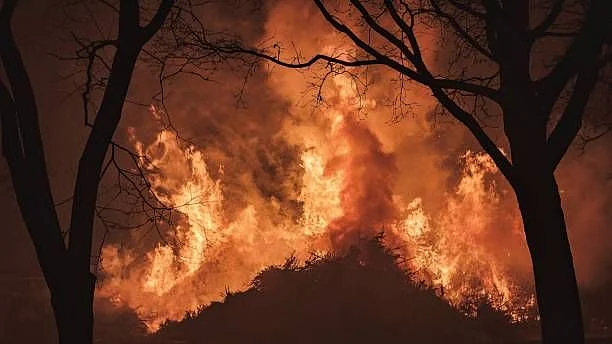The UK has been rather hot of late. So hot, in fact, that parts of England and Wales recently received their first ever red warning for extreme heat.
Coupled with months of below average rainfall, a heatwave sparked wildfires on 19 July – Britain’s hottest day ever – in places as far afield as Cornwall, Kent and Pembrokeshire. Wildfires also gave the London Fire Brigade its busiest day since the second world war.
Climate models predict summers in the UK will continue to become hotter, drier and more like those of southern Europe. This means that wildfires may well increase in frequency here, making us more like regions in southern France, Greece, Portugal and Spain which more regularly experience wildfires.
Wildfires were added to the national risk register of civil emergencies in 2012 – a UK government assessment of credible threats to society. But British wildfires are usually smaller and less intense than those in southern Europe, mainly burning moorlands and heathlands.
Deciduous forests, which are more widespread in the UK, are more fire-resistant than the pine forests of southern Europe, which are, at the time of writing, alight in many places.
There was an alarming sequence of wildfires in the north of England and Scotland in early 2019, when higher than average temperatures followed a relatively dry late winter. In February, fires engulfed Saddleworth Moor in Greater Manchester and in April, wildfires in Moray in the Scottish highlands raged for over two weeks.
While none of these fires came close to the conflagrations which afflict southern Europe, evidence suggests they are becoming more common in the UK.
An analysis of data from 2014 to 2020 showed a near-consistent increase in the number of wildfires recorded each year in the UK. This trend is linked to the changing climate and as such, is set to continue.
Managing the Risk
Scientists use the concept of “fire danger” to describe the chances of a fire spreading once it has ignited. By modelling fire danger, scientists predicted that there will be an increase in the occurrence of wildfires across the whole of the UK, with the number of “danger days” – when conditions suggest a fire might develop – in the southeast of England forecast to increase by between three and four times by the 2080s, with smaller increases further north. Modelling shows that these increases are comparable with those expected in Spain, where a threefold increase has been demonstrated as possible by 2050.
The Met Office quantifies the daily threat in its fire severity index, which assesses, on a scale of one to five, how severe a fire could become if one started. These threat predictions were proven accurate on 19 July, when the index predicted a threat level of five with “exceptional fire severity” possible in most of England.
These models allow us to understand the threat in different regions and to take appropriate steps to prevent fires igniting. One way of doing this is to educate the public about the main causes of wildfires and what they can do to reduce the risk of one developing, such as keeping common ignition sources like cigarettes, barbecues, fireworks or sky lanterns out of risky areas like grassland. This is important, as most wildfires are started, inadvertently or otherwise, by people.
The UK is at a latitude that offers lower temperatures and higher rainfall than its southern European neighbours. But as the climate changes, more severe wildfires may be something the country inherits.
The UK must take this threat seriously and ensure the increased risks are well publicised. More severe and wide-ranging climate hazards are in store – only eliminating carbon emissions will lower the risk of worsening fires both in the UK and abroad.
(Matthew Blackett is a Reader in Physical Geography and Natural Hazards at Coventry University. This is an opinion piece and the views expressed above are the author’s own. The Quint neither endorses nor is responsible for them. This article was originally published on The Conversation. Read the original article here.)
